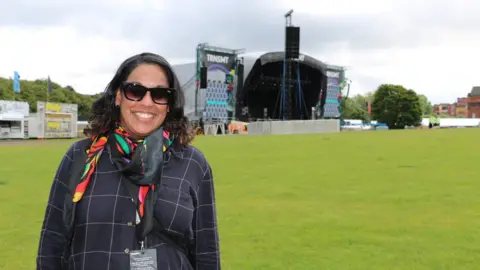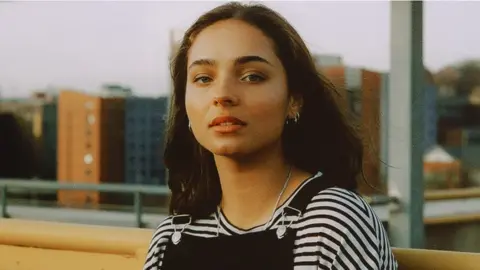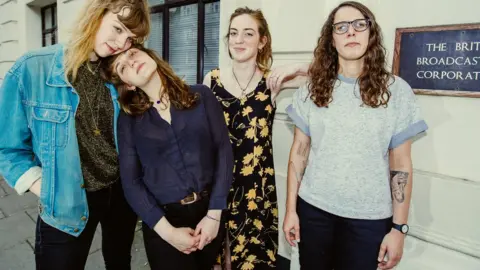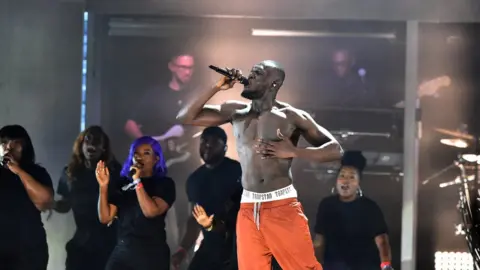TRNSMT: All-female stage isn’t about ‘segregating women’
 Getty Images
Getty ImagesOrganisers of TRNSMT festival have told Newsbeat their all-female stage doesn't aim to "segregate women" on the line-up.
The event, which is Scotland's biggest festival, was criticised for having a male-heavy bill when George Ezra, Catfish and the Bottlemen and Stormzy were named as 2019 headliners.
After saying there was "a long way to go" in gender balance at last year's festival, DF Concerts, which runs the festival, later unveiled a new Queen Tut's stage dedicated to emerging Scottish female-fronted acts.
Some saw it as positive step, while others labelled it "a box ticking exercise" in gender equality on line-ups.
 Getty Images
Getty ImagesAarti Joshi, the festival's head of communications, says that's "not the intention of the stage".
"I think there's maybe a fundamental lack of understanding of what the stage is for.
"We in no way want to segregate women or put them on a different stage - that is not the intention.
"Ultimately, the goal is that we take the artists who are playing on Queen Tut's - many of whom wouldn't be playing such a large festival without it - and support their progress and journey."
But unlike a number of other festivals, TRNSMT's organisers haven't signed up to a pledge to achieve a 50/50 gender balance by 2022.
 Getty Images
Getty ImagesOne of the acts playing on the stage over the weekend is singer-songwriter Tamzene.
She thinks the stage is a "good place to start" but doesn't see it as "the solution".
"It kind of feels a shame that it has to be a separate stage from the rest of the festival," she tells Newsbeat.
Allow Google YouTube content?
"I know it's not easy to book festivals…but hopefully moving forward this issue will be considered when booking the rest of the stages and across festivals.
Tamzene accepts the festival is trying to make amends for mistakes and that as an artist, she sees the stage as "an opportunity".
"But I definitely feel a wider conversation needs to be had and attitudes need to be addressed."
Aarti Joshi says having a balanced line-up is a "long-term goal" for TRNSMT.
"Queen Tut's offers the chance to change things from the ground up."
 WWW.LAURAPALMERPORTFOLIO.COM
WWW.LAURAPALMERPORTFOLIO.COMThe Big Moon, who performed on the festival's second biggest stage, agreed that it's "a shame they have to be on a different stage" but "support any addition of female artists to the festival bill" and welcomed the idea as a platform for emerging acts.
"It's not like all the women are one stage at the festival," said guitarist Soph Nathann.
"It's saying 'here's a place for female bands, who have less opportunity'.
"I feel like, shouldn't be like that in the long run because it should be balanced. But for now this is a good way of helping."
Bassist Celia Archer added: "That first step is the most intimidating; starting out, getting your first festival slots, playing your first gigs.
"And I like the the idea of going somewhere where you don't have an extra barrier of worry about that other acts on the stage are going to be like.
"Obviously, it's a shame that this has to happen, but that is kind of the state of things."
 Getty Images
Getty ImagesThe idea stemmed from a scheme which was launched on International Women's Day when Glasgow's new music venue King Tut's (which is also run by DF Concerts) was transformed into Queen Tut's for a series of shows from female acts.
Allow X content?
There are plans to have the stage at the festival for the next five years - with an aim to support the musicians long after the festival is over.
"We've always had a promise to grassroots artists where we build them up," adds Aarti.
"Ultimately, I hope people take Queen Tut's for what it is.
"I hope they come down and see some phenomenal talent and that those on the stage enjoy the performances over the weekend."


